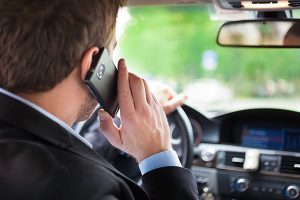Distracted Driving
Distracted Driving Study: One in Four Drivers Are Using Cell Phones Before Crashes
Here is another reason for Massachusetts and other states to consider passing laws which ban handheld cell phone use by drivers. A new study reports one in four drivers who crashed was using a cell phone within the previous minute. Cambridge Mobile Telematics released the study last week to coincide with April’s Distracted Driving Awareness Month.
Our country needs a reminder this year. Motor vehicle accident deaths are on the rise, as the National Safety Council reported nearly 40,000 deaths in traffic crashes last year. In fact, the period from 2014 to 2016 saw the largest two-year increase in more than 50 years.
Meanwhile, this year has already seen hundreds of deaths across the U.S. Just last month came a horrific accident in Texas. A driver in Uvalde County, who was texting while driving his pick-up truck, crashed into a church bus, killing 13 people. Texas is one of 5 states which do not ban texting while driving.
New Distracted Driving
Over the past 18 months, Massachusetts-based Cambridge Mobile Telematics tracked about 1,000 car accidents via its smartphone app called DriveWell. Some insurance companies offered customers the app and provided incentives for safe driving.
The app uses a smart phone’s sensors to track driver behaviors, such as the way a phone is held. Drivers in stopped vehicles were not counted. The app tracks distracted driving behaviors at speeds greater than 9 miles per hour. Some 29 percent of the distracted drivers were traveling much faster though, over 56 mph.
Massachusetts is one of 45 states which bans the practice of texting while driving. The state’s ban has been in place since September 2010.
Drivers can still make phone calls, except for junior operators who are under age 18 and bus drivers. Though the Massachusetts state Senate did approve a handheld cell phone ban in 2016, the bill never cleared the state House of Representatives.
Allowing drivers to make handheld cell phone calls is a safety hazard and makes it hard for police to enforce the state’s texting while driving ban. Many argue police cannot differentiate between a driver picking up their phone to make a call or reaching for it to check their e-mail or text messages.
But the DriveWell study gives the state of Massachusetts another reason to consider a cell phone ban. Some 14 states already have these bans, including New Hampshire.
Reducing the Distractions in Your Car
Most people think of distracted driving as cell phone use, texting and checking your Facebook accounts. But the distractions run deeper. Distracted driving is really any behavior that takes your attention off the road, including eating, drinking or being engaged in conversations with passengers that take your attention off the road. Think about your own driving routine. How can you reduce the distractions?
About Breakstone, White & Gluck
The Boston car accident lawyers at Breakstone, White & Gluck have over 100 years combined experience representing those who have been injured in car accidents, truck accidents and motorcycle accidents. If you have been injured, learn your rights for seeking compensation. For a free legal consultation, contact our attorneys at 800-379-1244 or 617-723-7676 or use our contact form.
Will Massachusetts Pass a Handheld Cell Phone Ban for Drivers?
As attorneys, we have represented hundreds of victims of motor vehicle crashes over the past three decades. In recent years, we have seen texting while driving and cell phone use by drivers multiply at an alarming rate, causing a stunning number of injuries and deaths. These injuries are preventable, but each year, drivers continue to reach for their phones and the toll rises.
According to the US Department of Transportation, cell phones are now involved in 1.6 million auto crashes each year, injuring 500,000 people and causing 6,000 deaths. While many states have already passed legislation to reduce distracted driving accidents, some are now considering additional measures, including Massachusetts.
Massachusetts lawmakers passed the Safe Driving Law in 2010, which banned texting while driving. There was no further action until January 2016, when the Massachusetts state Senate passed a bill banning handheld cell phone use. The ban would have allowed drivers to use hands free technology to dial and talk. According to the State House News Service, the Massachusetts House of Representatives gave initial approval to a similar bill but the legislation stalled.
With Governor’s Comments, Handheld Cell Phone Debate Returns to the News
 There was no update for several months. Then Governor Charlie Baker spoke in February, indicating he may not support a handheld ban.
There was no update for several months. Then Governor Charlie Baker spoke in February, indicating he may not support a handheld ban.
“I don’t want to get out of the business of making it possible for people to talk to other people when they’re driving. Because I think the texting thing is a big problem. I’m not sure I believe that the talking thing is,” Baker said during his “Ask the Governor” segment on WGBH Thursday. His comments were published by the State House News Service.
When the show’s co-host noted that drivers could use hands-free Bluetooth devices, Baker said:
“So now we’re just going to let people who can afford to put a Bluetooth in their new car to have the ability to talk when they’re in a car?” Baker responded. “But we’re not going to let anybody else? Hmm. Let me think about that one a little.”
Following the interview, The Boston Herald called on state lawmakers to resume their work to ban handheld cell phones: “Drivers in Massachusetts have proven that when it comes to using their phones behind the wheel they’re incapable of regulating themselves.”
When texting while driving was banned in 2010, texting was the major concern for distracted driving, the Herald wrote. Today, more people have smartphones which offer quick access to social media and other apps.
How Widespread is Texting While Driving in Massachusetts?
Critics say enforcement for Massachusetts’ texting while driving ban is challenging when drivers can hold their phones to talk, but not for other purposes. Police have worked through some of these issues. According to a Boston Globe analysis, Massachusetts police officers wrote 6,131 tickets in 2015, compared to 1,153 in 2011, the first year of the ban. Overall, between late 2010 and mid-April of 2016 when the analysis was published, 18,383 tickets were issued for texting while driving in Massachusetts.Drivers under 40 years old received the most tickets and many drivers got caught during Distracted Driving Awareness Month, when many local police departments receive safety grants for enforcement.
Where Proposed Legislation Now Stands in Massachusetts
Massachusetts is one of 46 states which have texting while driving laws. Just 14 states also ban handheld cell phone use, according to the National Conference of State Legislatures. New Hampshire, Vermont and Connecticut are among the early adopters.
Expect to hear more debate about a handheld cell phone ban in Massachusetts at some point in the future. While Governor Baker has voiced reservations, when the 2017-2018 legislative session began in January, the Massachusetts House of Representatives referred legislation for hands-free cell phone devices to the Legislature’s Joint Committee on Transportation.
Where to Find Distracted Driving Safety Campaigns and Information
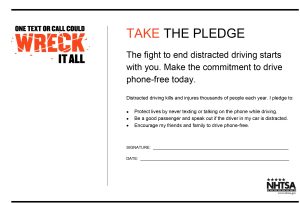
Safety campaigns are critical to preventing distracted driving accidents. There are many out there, offering programs for schools and information online. One effort is from the Massachusetts Academy of Trial Attorneys (MATA), which brings its “End Distracted Driving” program to high schools. We support this campaign. Two of our partners, Marc L. Breakstone and Ronald E. Gluck, serve on the MATA Board of Governors. Partner David W. White is a long-time member.
Another effort comes from the National Highway Traffic Safety Administration (NHTSA), which offers this pledge which family members can sign to promise each other they will not use a cell phone while driving.
Distracted Driving Prevention and Safety Campaigns:
Distraction.gov: Official U.S. website for distracted driving.
It Can Wait!: AT&T’s documentary to stop distracted driving.
Message to Massachusetts Lawmakers: Time for Cell Phone Ban
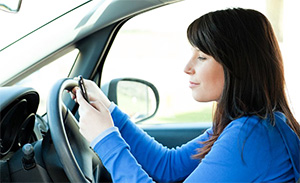 The Massachusetts State Senate is expected to consider a ban on hand-held mobile electronic devices while driving. Many feel a ban is long overdue and we agree.
The Massachusetts State Senate is expected to consider a ban on hand-held mobile electronic devices while driving. Many feel a ban is long overdue and we agree.
“Even New Hampshire has gone hands-free. It’s time for Beacon Hill to act,” wrote the Boston Herald editorial board.
The Senate is expected to consider the ban Thursday. Under the proposed legislation, Massachusetts drivers could still talk on the phone using hands-free technology.
Drivers would receive a $100 fine for the first violation, $250 for the second and $500 for all subsequent violations. Drivers cited three times would receive an auto insurance surcharge.
The bill would change the law in Massachusetts for all drivers over 18. Junior operators are already banned from cell phone use behind the wheel.
According to the National Safety Council, cell phone use is now estimated to be involved in 26 percent of all motor vehicle crashes. At any given moment of the day, 660,000 drivers are using cell phones or manipulating electronic devices while driving, according to the National Highway Traffic Safety Administration (NHTSA). The NHTSA also reported one survey found almost half of all drivers will answer an incoming call while driving. One in four drivers is willing to place a call on all, most, or some trips.
Texting While Driving Bans
In 2010, then-Massachusetts Governor Deval Patrick signed a bill into law which banned texting while driving. The state is in good company; today, 46 states and the District of Columbia have banned texting while driving. By contrast, only 14 states have banned hand-held cell phone use, including New Hampshire, Vermont and Connecticut. Maine and Rhode Island have banned texting while driving but hand-held cell phone bans have failed to gain enough support.
Related:
Read the Boston Herald’s recent editorial on a hand-held cell phone ban in Massachusetts.
Summary of the Safe Driving Law, Massachusetts Registry of Motor Vehicles
Read More
Back to School is Time for a Family Talk About Texting While Driving and Distracted Driving
As students head back to classes, this is a good time for families to talk about cell phones and distracted driving.
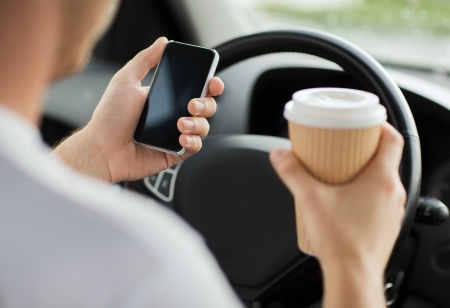
Each day, nine people are killed in the U.S. in crashes involving distracted driving behaviors, such as using a cell phone, texting while driving or eating. More than 1,100 are injured.
There are now 46 states which ban texting while driving, including Massachusetts, which banned the practice in 2010. Junior operators are not allowed to use cell phones at all in Massachusetts.
For Parents
No Cell Phone Rule. Lead by example. Put your cell phone away while driving your children to school. Tell them to put theirs away too because it creates a distraction for you on the roads. Make this a rule for school drop-offs and pick-ups. If you can, extend it to other travel times.
Drop-Off Zone. After you drop your child off at school, resist the urge to immediately check your cell phone in the drop-off zone. Drive away and check later.
Children and Teens
No Cell Phone Use While Commuting. Keep telling your children the cell phone is not for use while commuting to school. Even if they are young and many years away from driving, they can learn now how distracting any cell phone use can be in the car.
Children should not use cell phones while walking or riding bikes to school, either. They can check in with social media, e-mail and text messages at home. If they must, tell them to step several feet off the sidewalk. Make it clear it is not safe to stop in a parking lot.
School Bus. Encourage your child to keep their cell phone packed on the ride so they can be aware of what is going on around them.
Reward Your Child For Not Using a Cell Phone. When your children do as you ask and leave the cell phone packed up, let them know you noticed.
Teen Drivers
Talk to Your Teen Drivers. Take some time to remind them not to use their cell phone behind the wheel. They could seriously injure someone or be stopped by police and face fines and a temporary loss of license.
No Passengers. Do not allow them to carry other teenage passengers with them until they become experienced drivers, and even then they should limit the number of passengers in their cars. Your teenager needs all their energy to focus on the roads and avoid car accidents.
Your teenager may not be happy with your rules, but younger drivers under 25 are two to three times more likely to text or e-mail while driving than others, according to the National Highway Traffic Safety Administration. You want to protect your teenager and help them develop safe habits.
Share Safety Materials. Do not be your teen’s only source of information. Occasionally share safety campaign information or news articles about texting while driving with them. One resource is the AT&T It Can Wait campaign.
Read More
Distracted Driving Lessons in Massachusetts
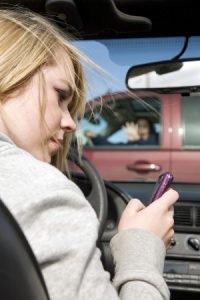 This month, students at four high schools in Massachusetts will sit down at computer simulators and learn what it feels like to text or use a cell phone while driving and then crash.
This month, students at four high schools in Massachusetts will sit down at computer simulators and learn what it feels like to text or use a cell phone while driving and then crash.
This is part of Arbella Insurance Foundation’s Distractology 101 program, which will visit Braintree High School, Phillips Academy in Andover, Falmouth High School and Sacred Heart High School in Kingston. Although the young drivers will not actually suffer or cause injury, or feel the remorse of having caused the collision, they will be taught the lesson that distracted driving behaviors, such as cell phone use, using a GPS and even eating and drinking, can result in car accidents and serious injuries. These behaviors should be considered as or more dangerous than speeding or running a red light.
Consider these statistics from the National Highway Traffic Safety Administration (NHTSA):
- 10 percent of all fatal crashes in 2011 were reported as distraction-affected crashes (3,331 people killed).
- Among those who were killed, 12 percent died in a car crash which involved cell phone use.
- Some 17 percent of all injury crashes in 2011 were reported as distracted-affected crashes (or 387,000 people injured).
- Among those who were injured, 5 percent were injured in a car accident which involved cell phone use.
Laws have been implemented to reduce the dangers caused by distracted driving. While no state bans all drivers from all cell phone use, hand-held cell phone use is not permitted in 15 states, including Vermont as of Oct. 1.
Laws related to texting while driving are much more prevalent. Texting while driving is now against the law in 44 states. Washington passed the first ban in 2007. Massachusetts implemented its law four years ago. The law, St. 2010, c. 155, bans texting by drivers, including reading, writing or sending messages. Drivers cannot text while driving or sitting at red lights, intersections or other public ways. This is a primary offense, meaning police can pull drivers over when they suspect the behavior, even without any other cause.
Despite these laws, drivers here and in other states still text and check their social media accounts. Younger drivers under 25 are two to three times more likely to text or e-mail while driving than others, according to the NHTSA. But these violations are not limited to young drivers, as the evidence is that older drivers are also engaging in this prohibited behavior.
Fortunately there is some evidence that these laws are starting to work. Recently The Journal of American Health reported that traffic fatalities had dropped 3 percent in states which have primary enforcement laws like Massachusetts. States that ban younger drivers from texting while driving saw an 11 percent drop. The journal studied national traffic data over 11 years.
States may continue to pass laws to reduce distracted driving, but drivers carry responsibility for putting down the phone and becoming aware of other distracting behaviors, such as eating and drinking, talking to passengers, grooming, reading maps, using a GPS, watching a video or adjusting a radio or music player.
There are some good safety resources out there to help families understand the problem and the attitudes and behaviors that contribute to it. We encourage you to take a look and share them with your colleagues at work and with your family, friends, and children.
For More Information
About Breakstone, White & Gluck
The Boston motor vehicle accident lawyers at Breakstone, White & Gluck have over 100 years combined experience representing clients seriously injured in car accidents. If you have been injured, it is important to learn your rights. For a free legal consultation, contact us at 800-379-1244 or 617-723-7676 or use our contact form.
October Sees the Most Auto Accident Claims from Teen Drivers
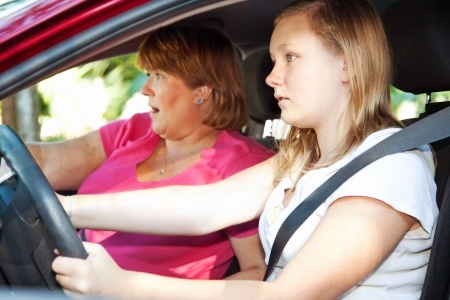 Sept. 30 will mark three years since the state of Massachusetts strengthened its laws for teen drivers.
Sept. 30 will mark three years since the state of Massachusetts strengthened its laws for teen drivers.
Under the Safe Driving law, which took effect in 2010, teen drivers age 16 ½ to 18 are banned from all cell phone use and there is no texting while driving for operators of any age. The Junior Operator Law, which was passed in 2007, bans teen drivers from carrying passengers under the age of 18, except siblings. They also cannot drive between the hours of 12:30 a.m. and 5:00 a.m., unless accompanied by a parent.
Massachusetts is not alone; most states now have Graduated Licensing Laws restricting teen drivers in some way. In 47 states, novice drivers have passenger restrictions and 48 states limit nighttime driving. Teens are banned from all cell phone use in 37 states.
There is good reason for the laws: For each mile of roadway, teens age 15- to 20-years-old are three times more likely to die in a car accident than other drivers, according to the National Highway Traffic Safety Administration.
Now is a good time to observe how well your teen driver is obeying the laws. Every year, the AAA Foundation for Traffic Safety reports June, July and August see the largest number of teen driving deaths. But one nationwide company, State Farm Insurance, reports October is another dangerous time. It sees the most claims from 16- and 17-year-old drivers in this month, up 15 percent from other times.
Teen drivers get into auto accidents because they lack experience, are sensitive to distractions and do not always follow the rules. A few tips for helping your Massachusetts teen driver:
Say No to Teens Using Their Cell Phones. Many teens are texting while driving, despite the laws. In a 2011 study of 8,500 U.S. high school students age 16 and older, 45 percent admitted to texting or e-mailing while driving in just the past 30 days. The study was conducted by the Centers for Disease Control and Prevention and was published in the June issue of Pediatrics Journal. These teens were more likely not to wear their seat belt.
Encourage your teen to turn their cell phone off or put it in the backseat while driving. Taking a peek at text messages, e-mails or their Facebook page is not allowed. That includes while sitting at traffic lights and intersections where they need to look out for other traffic, as well as pedestrians and cyclists.
Limit Teen Passengers in the Car. Drivers under 18 in Massachusetts are not allowed to carry passengers under the age 21, except siblings. Be vigilant on this point with your teen. Among 16- and 17-year-old drivers, there is a 44 percent higher chance they will be killed in a crash with even one passenger under 21 years old, according to the AAA Foundation for Traffic Safety. The number multiplies with each additional passenger under 21, but decreased over 60 percent for each passenger age 35 or older.
Test Drive School Zones. Let your teen observe from the passenger seat as you drop them off to school and pick them up. You will encounter traffic, bicyclists and children walking, which will be new and potentially stressful for them as a driver (even if they traveled this area during their Driver’s Education practice hours). Point out how you adjust to the activity and decrease your speed.
If you do not drive to school, take this ride outside school hours and then let them drive. The goal is to make them aware of the challenges and make them comfortable in case they have to drive at some point.
Cyclists and Pedestrians. Remind your teen of what they learned in Driver’s Education class. Make sure they stop well behind the crosswalk at intersections and always let pedestrians pass. Remind them that cyclists can travel the full width of the road. Remind them to make sure cyclists are not approaching when they open any doors in the car.
Other Driving Safety Tips. These are the foundation of all driving safety tips, but always worth a reminder for safety’s sake: Talk to your child about always wearing a seat belt, following the speed limits and never using drugs or alcohol while operating.
The most important things are to talk to your children about driving and to set a good example yourself when they are in the car with you. Visit this web page for additional suggestions.
Related:
Teen Driver Safety Week
Study: Teens who text and drive take even more risks, USA Today
Read More
Please Put Down Your Cell Phone, Eliminate Driving Distractions for Back to School
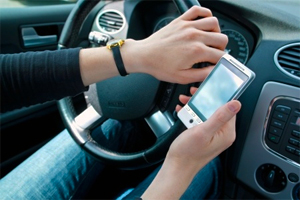 We suggest parents now talk to your children about the rules for getting to and from school safely. No skipping over the hard part: talking about when everyone, parents and children alike, should put down the cell phone.
We suggest parents now talk to your children about the rules for getting to and from school safely. No skipping over the hard part: talking about when everyone, parents and children alike, should put down the cell phone.
Walking to School. Encourage your child to use sidewalks and crosswalks with crossing guards or walk signals. Agree on a route with your child and never let them walk alone. Every year, drive or walk the route yourself so you can identify any problems.
Bicycling. Make sure your child wears a helmet – it’s the law and it’s common sense. While your child has many of the same rights as a driver, remind them to take it slow in parking lots or and when passing cars. They should learn to make eye contact with drivers in their vicinity–that way they can read the intention of the driver more clearly. Read about Massachusetts law for bicyclists.
Late Activities. It will get dark earlier now. Make sure you child has a safe way home after it gets dark. Consider picking them up or make other arrangements.
Reflective Clothing. If your teenager needs to walk at night or be near traffic, consider purchasing reflective clothing to keep at home. Many backpacks and sneakers have reflectors–look for products like that.
Ask Your Children to Put Away Their Cell Phone. When students are distracted, they may not be able to respond to drivers who are not using caution. Safe Kids Worldwide, a non-profit organization, recently reported that it observed 34,000 children crossing the street near 68 U.S. schools. Of these, one in five high school students were distracted by an electronic device. The rate was one in eight among middle school students.
The numbers are significant because pedestrian accidents involving teens age 16-19 have increased 25 percent over the past five years, Safe Kids Worldwide reports. This age group now accounts for about half of all pedestrian accidents among youth.
School Buses. At the beginning of the year, stand out at the bus stop with your children. Explain to them the appropriate areas to stand while waiting and how to board the bus.
Parents and Teen Drivers: Commit to No Distracted Driving
Finally, parents if you are driving, commit to putting away your cell phone. Texting while driving is against the law in Massachusetts and that includes viewing texts, e-mails or browsing the Internet.
Drivers need to eliminate distractions, especially when children are in the car, and especially in busy drop-off areas at schools, because car accidents can occur. This time of year, bus drivers and other parents who are driving are still getting used to their new routine and may not use proper caution when stopping or turning.
Also avoid using your cell phone while parked outside of schools or at bus stops waiting for your children – even just to make phone calls. An accident can happen in the instant you let your guard down and reach for your cell phone to view a text message or check in on a social media account.
If you have a teenager who drives, remind them not to use their cell phone while driving (this is the law in Massachusetts for junior operators). You have probably done so in the past, but explain the school parking lot is busy and there is no room for distracted driving. If they want to use their cell phone in a parking lot, suggest they park the car, get out and walk off the pavement first.
Related:
Distraction.gov
Filmmaker Explores Painful Consequences of Texting While Driving
For a free legal consultation, contact us at 800-379-1244 or 617-723-7676 or use our contact form.


